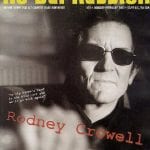Blue Mountain – It’s not all over now, baby blue
The South is very much at the heart of Roots, nine songs drawn from folk traditions that predate recorded music — “Rye Whiskey”, “Riley And Spencer”, “Come All You Fair And Tender Ladies” — that equally evoke Oxford’s past and present.
It is also the sound of a band pausing to take a deep breath, regrouping.
“It felt like the whole momentum had really slowed down with that third record,” Cary says. “We wanted to keep it going, but it wasn’t the right time to try to scramble and write an album’s worth of songs. And so I was like, OK, I know where I can go find some great songs. I had about six tunes in mind already, but I was really lucky, because I had this resource in Oxford, the Center of Southern Studies. So I spent about two weeks going through that, looking for songs.”
Pouring through the Kenneth Goldstein collection at Ole Miss, he picked up “Rain And Snow”, “That Nasty Swing” (by Cliff Carlisle), and “Riley And Spencer”. That last is the same song Tim O’Brien, Dirk Powell and John Herrmann resurrected for 1998’s Songs From The Mountain (they spell it “Raleigh And Spencer”), but in the best traditions of folk music, Cary hasn’t heard their version. “I found this song, ‘Rain And Snow’, and I was so enthusiastic, and I’d never heard it before,” he adds. “After we cut it, somebody said, ‘Oh, yeah, the Grateful Dead used to do that.'”
For most of Blue Mountain’s career, Cary has been the band’s principal songwriter. On Tales Of A Traveler, Laurie Stirratt’s voice began to emerge. (She also switched from bass to acoustic guitar for the subsequent tours.) “This last record, I wrote some separately and we co-wrote some, and Cary wrote some separately, but I think we ended up co-writing like 35 songs,” she says. “We weeded a lot out, but that was a really good experience for me, not having a whole lot of experience with songwriting and feeling comfortable enough with somebody else to be able to write. That’s really hard. I can’t do it with anyone else, you know, except for him.”
Well, there is one other person with whom Laurie has co-written some: Her twin brother. “We haven’t done nearly what we’ve wanted together, you know,” she says. “We want to make a record together. I think the last few years have just been so busy for both of us that we have not been able to get it together. But that’s a goal for us, actually. I’d love to do that, because I think the vocal thing could be really interesting.” (John Stirratt has finished a solo album that may or may not be released by Black Dog.)
All that writing makes it tempting to suspect, what with their marriage freshly ended, that neither Laurie nor Cary really wished to record nor to perform the songs that might emerge from those private circumstances. No, they will not update Richard and Linda Thompson’s Shoot Out The Lights.
“Honest to God,” Cary says over the phone later, “that really is a factor. You know, we kinda did it last time, too. We addressed a lot of those issues on the last record, kind of on an unconscious level. Nothing’s better than a great heartbreak song, but I wanted to take some time off from writing that.”
That said, the Roots songs are well-chosen, well-played, and have as much to do with who Blue Mountain are, and where they come from, as anything they’ve recorded to date. After all, credits to Robert Johnson, Skip James, and that Traditional chap go back even to their Hilltops days. “Those kinds of songs are where we got our inspiration from,” Laurie says simply. “And there’s some pretty heavy-duty songs on the record, as far as subject matter.”
Which has led to no small trouble naming the album. “Nick Cave already had Murder Ballads, you know?” Cary chuckles. “I think Roots works, and it’s funny on an ironic level.”
“What I’m looking forward to,” Laurie adds, “which we’ve never done since we’ve been on a label: I really want to make some money off our own records. We never made a dime off of the last three records. Really, all the money that we have lived off of is from touring. That’s it.
“We just want to see some money from our own records for a change. And I think if we do this traditional record right, we can sell a lot. I think we can sell as many as Roadrunner sold, at least of our last record, surely.”




